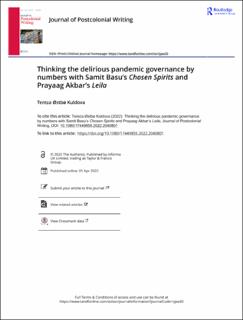| dc.contributor.author | Kuldova, Tereza Østbø | |
| dc.date.accessioned | 2022-12-12T10:07:00Z | |
| dc.date.available | 2022-12-12T10:07:00Z | |
| dc.date.created | 2022-04-01T12:29:31Z | |
| dc.date.issued | 2022-04-01 | |
| dc.identifier.citation | Journal of Postcolonial Writing. 2022, 1-16. | en_US |
| dc.identifier.issn | 1744-9855 | |
| dc.identifier.issn | 1744-9863 | |
| dc.identifier.uri | https://hdl.handle.net/11250/3037197 | |
| dc.description.abstract | Globally, the COVID-19 pandemic has accelerated the adoption of technocratic near-real-time data-driven governance, in that new rules, measures, and prohibitions have been introduced and revoked in response to predictive statistical and epidemiological models, graphs, charts, and aesthetically powerful data visualizations. Pandemic governance has enforced an extreme governance by numbers. The real has come to mirror the structure of dystopian fiction. In his analysis of governance by numbers, Alain Supiot shows how this form of governance ushers in a return of ties of allegiance and the re-emergence of feudalism in new guises. While the rise of technocratic autocracy and security regimes has been remarked upon, the simultaneous return of bonds of allegiance has been to a large degree overlooked. And yet it appears in recent postcolonial dystopian literature from India, Samit Basu’s Chosen Spirits and Prayaag Akbar’s Leila, which this article reads as illuminating the extreme endpoint of this delirious governance. | en_US |
| dc.description.sponsorship | This work was funded by the Research Council of Norway under project no. 313626 – Algorithmic Governance and Cultures of Policing: Comparative Perspectives from Norway, India, Brazil, Russia, and South Africa (AGOPOL). | en_US |
| dc.language.iso | eng | en_US |
| dc.publisher | Routledge | en_US |
| dc.relation.ispartofseries | Journal of Postcolonial Writing;Volume 58, 2022 - Issue 2: Special Issue: Fractured Identities | |
| dc.relation.uri | https://www.tandfonline.com/doi/full/10.1080/17449855.2022.2040801 | |
| dc.rights | Navngivelse 4.0 Internasjonal | * |
| dc.rights.uri | http://creativecommons.org/licenses/by/4.0/deed.no | * |
| dc.subject | Postcolonial dystopia | en_US |
| dc.subject | Governance by numbers | en_US |
| dc.subject | India | en_US |
| dc.subject | Inequality | en_US |
| dc.subject | COVID-19 | en_US |
| dc.subject | Ties of allegiance | en_US |
| dc.title | Thinking the delirious pandemic governance by numbers with Samit Basu’s Chosen Spirits and Prayaag Akbar’s Leila | en_US |
| dc.type | Peer reviewed | en_US |
| dc.type | Journal article | en_US |
| dc.description.version | publishedVersion | en_US |
| dc.rights.holder | © 2022 The Author(s) | en_US |
| cristin.ispublished | true | |
| cristin.fulltext | original | |
| cristin.qualitycode | 1 | |
| dc.identifier.doi | https://doi.org/10.1080/17449855.2022.2040801 | |
| dc.identifier.cristin | 2014511 | |
| dc.source.journal | Journal of Postcolonial Writing | en_US |
| dc.source.volume | 58 | en_US |
| dc.source.issue | 2 | en_US |
| dc.source.pagenumber | 1-16 | en_US |
| dc.relation.project | Norges forskningsråd: 313626 | en_US |

